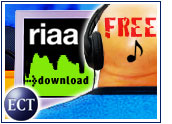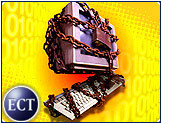
An industry group that represents Kazaa has proposed a strategy that, if employed, could turn some peer-to-peer file-sharing services into a source of revenue for the recording industry.
The Distributed Computing Industry Association (DCIA), which represents Kazaa’s parent companies Sharman Networks and Altnet, has suggested that music files traded through peer-to-peer networks could be encrypted so that only users who pay an access fee would be able to access the files.
P2P Networks
Peer-to-peer file-sharing networks make use of technologies that let users search each other’s hard drives for music or other files that they then can download. While such technologies provide efficient distribution networks, they have fostered an explosion in music piracy.
The Recording Industry Association of America (RIAA) has been suing consumers who allegedly have violated music copyright on a large scale.
And while legitimate download services, such as iTunes and BuyMusic.com, have been offering a for-pay alternative to pirating music online, major file-sharing software vendors have been searching for new business models to generate revenue for the music business and become legit.
Several file-sharing services offer their software for free to users — and typically support their development costs with advertising. But this revenue model does nothing directly for the music industry.
RIAA’s Legal Actions
According to some reports, the RIAA’s legal actions over the past several months have reduced the amount of online file-trading. Nielsen//NetRatings, for example, reports that file-sharing activity has dropped by 41 percent in the wake of the RIAA’s actions.
So far, however, the recording industry seems not to be interested in the new Kazaa proposal to legitimize the major peer-to-peer networks.
The DCIA has argued that the scheme could generate around US$900 million per year for the music industry, but the organization acknowledges that would only be the case if competing file-sharing networks agree to cooperate.
The Big If
That is a big if, because it is likely that even if Kazaa were to go legit, other file-sharing services immediately would step into the new void.
For example, Napster at one point was the dominant peer-to-peer music network. When Napster was sued, blocked and brought down, other music-sharing networks sprang up to take its place.
The recording industry has stood behind the legit download services, such as Apple’s iTunes. In fact, iTunes, the most successful legit service so far, has sold about 10 million songs since launching in April 2003.
The system lets users download individual songs for 99 cents and encodes files in a format that prevents customers from sharing them without restriction.





































